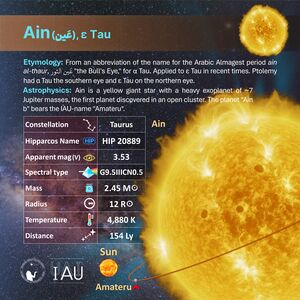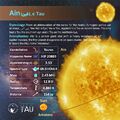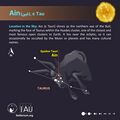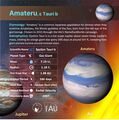Ain: Difference between revisions
(Created page with "Ain is a modern star name adopted by the International Astronomical Union in the IAU-Catalog of Star Names (IAU-CSN). Its origin is Arabic. It is the name of HIP20889. (ε Tau, HR 1409) in constellation Tau. ==Etymology and History== From an abbreviation of the sci-A name ain al-thaur "the Bull's Eye," for a Tau. Applied to ε Tau in recent times (Ptolemy had α Tau the southern eye, and ε Tau on the northern eye). ==Mythology== ==IAU Working Group on Star Names==...") Tag: Disambiguation links |
No edit summary |
||
| (3 intermediate revisions by 2 users not shown) | |||
| Line 1: | Line 1: | ||
[[File:Ain profileCard SadeghFaghanpour-IAU-WGSN.jpg|thumb|Ain - profile card (CC BY Sadegh Faghanpour for IAU-WGSN).]] |
|||
Ain is a modern star name adopted by the International Astronomical Union in the IAU-Catalog of Star Names (IAU-CSN). Its origin is Arabic. It is the name of |
Ain is a modern star name adopted by the International Astronomical Union in the IAU-Catalog of Star Names (IAU-CSN). Its origin is Arabic. It is the name of HIP 20889 (ε Tau, HR 1409) in constellation Tau. |
||
==Etymology and History== |
==Etymology and History== |
||
Kunitzsch and Smart (2006)<ref>Kunitzsch, Paul; Smart, Tim (2006). A Dictionary of Modern star Names: A Short Guide to 254 Star Names and Their Derivations (2nd rev. ed.). Cambridge, Massachusetts: Sky Pub.</ref> think, the name is an abbreviation of the scholarly Arabic in mediaeval times, name ''ain al-thaur'', "the Bull's Eye", for α Tau which was applied to ε Tau in recent times. However, Ptolemy had α Tau the southern eye, and ε Tau on the northern eye. |
|||
=== Ptolemy's Almagest (~135 CE) === |
|||
{| class="wikitable" |
|||
!id |
|||
!Greek |
|||
(Heiberg 1898) |
|||
!English |
|||
(Toomer 1984) |
|||
!ident. |
|||
|- |
|||
! |
|||
!Ταύρου ἀστερισμός |
|||
!Constellation of [[Taurus]] |
|||
! |
|||
|- |
|||
| |
|||
| |
|||
| |
|||
| |
|||
|- |
|||
|14 |
|||
|ὁ λαμπρὸς τῶν Ῥάδων ἐπὶ τοῦ νοτίου ὀφθαλμοῦ ὑπόκιρρος |
|||
|The stars in the face, called 'the Hyades': the bright star ofthe Hyades, the reddishone on the southern eye |
|||
|α Tau |
|||
|- |
|||
|15 |
|||
|ὁ λοιπὸς καὶ ἐπὶ τοῦ βορεύου ὀφθαλμοῦ |
|||
|The stars in the face, called 'the Hyades': the remaining one, on the nordlern eye |
|||
|ε Tau |
|||
|} |
|||
==== Arabic translation ==== |
|||
{| class="wikitable" |
|||
|14 |
|||
|... |
|||
|النجوم في الوجه، تسمى ”الهياديس“: النجم الساطع من الهياديس، النجم المحمر في العين الجنوبية |
|||
| |
|||
|α Tau |
|||
|- |
|||
|15 |
|||
|... |
|||
|النجوم في الوجه، تسمى ”الهياديس“: النجمة المتبقية، على العين الشمالية |
|||
| |
|||
|ε Tau |
|||
|} |
|||
The fact of [[Taurus]], the Bull, consists of two eyes, nostrils and other stars in the Hyadres star cluster. So, the name "Eye" can be a direct translation from Ancient Greek to Arabic. |
|||
==Mythology== |
==Mythology== |
||
==IAU Working Group on Star Names== |
==IAU Working Group on Star Names== |
||
The name was adopted by the IAU WGSN on 2015/12/15. |
The name was adopted by the IAU WGSN on 2015/12/15. The star is a yellow giant with a confirmed exoplanet which was named simultaneously with the star (Amateru). <gallery> |
||
File:Ain profileCard SadeghFaghanpour-IAU-WGSN.jpg|Ain - profile card (CC BY Sadegh Faghanpour for IAU-WGSN). |
|||
File:Ain stickfigure SadeghFaghanpour-IAU-WGSN.jpg|Ain - stickfigure (CC BY Sadegh Faghanpour for IAU-WGSN). |
|||
File:Amateru profileCard SadeghFaghanpour-IAU-WGSN.jpg|Ain's planet Amateru - profile card (CC BY Sadegh Faghanpour for IAU-WGSN). |
|||
</gallery> |
|||
==Weblinks== |
==Weblinks== |
||
Latest revision as of 19:43, 5 November 2025
Ain is a modern star name adopted by the International Astronomical Union in the IAU-Catalog of Star Names (IAU-CSN). Its origin is Arabic. It is the name of HIP 20889 (ε Tau, HR 1409) in constellation Tau.
Etymology and History
Kunitzsch and Smart (2006)[1] think, the name is an abbreviation of the scholarly Arabic in mediaeval times, name ain al-thaur, "the Bull's Eye", for α Tau which was applied to ε Tau in recent times. However, Ptolemy had α Tau the southern eye, and ε Tau on the northern eye.
Ptolemy's Almagest (~135 CE)
| id | Greek
(Heiberg 1898) |
English
(Toomer 1984) |
ident. |
|---|---|---|---|
| Ταύρου ἀστερισμός | Constellation of Taurus | ||
| 14 | ὁ λαμπρὸς τῶν Ῥάδων ἐπὶ τοῦ νοτίου ὀφθαλμοῦ ὑπόκιρρος | The stars in the face, called 'the Hyades': the bright star ofthe Hyades, the reddishone on the southern eye | α Tau |
| 15 | ὁ λοιπὸς καὶ ἐπὶ τοῦ βορεύου ὀφθαλμοῦ | The stars in the face, called 'the Hyades': the remaining one, on the nordlern eye | ε Tau |
Arabic translation
| 14 | ... | النجوم في الوجه، تسمى ”الهياديس“: النجم الساطع من الهياديس، النجم المحمر في العين الجنوبية | α Tau | |
| 15 | ... | النجوم في الوجه، تسمى ”الهياديس“: النجمة المتبقية، على العين الشمالية | ε Tau |
The fact of Taurus, the Bull, consists of two eyes, nostrils and other stars in the Hyadres star cluster. So, the name "Eye" can be a direct translation from Ancient Greek to Arabic.
Mythology
IAU Working Group on Star Names
The name was adopted by the IAU WGSN on 2015/12/15. The star is a yellow giant with a confirmed exoplanet which was named simultaneously with the star (Amateru).
Weblinks
- Website of the IAU WGSN: https://exopla.net/
Reference
- References (general)
- Kunitzsch, Paul; Smart, Tim (2006). A Dictionary of Modern star Names: A Short Guide to 254 Star Names and Their Derivations (2nd rev. ed.). Cambridge, Massachusetts: Sky Pub.
- ↑ Kunitzsch, Paul; Smart, Tim (2006). A Dictionary of Modern star Names: A Short Guide to 254 Star Names and Their Derivations (2nd rev. ed.). Cambridge, Massachusetts: Sky Pub.








